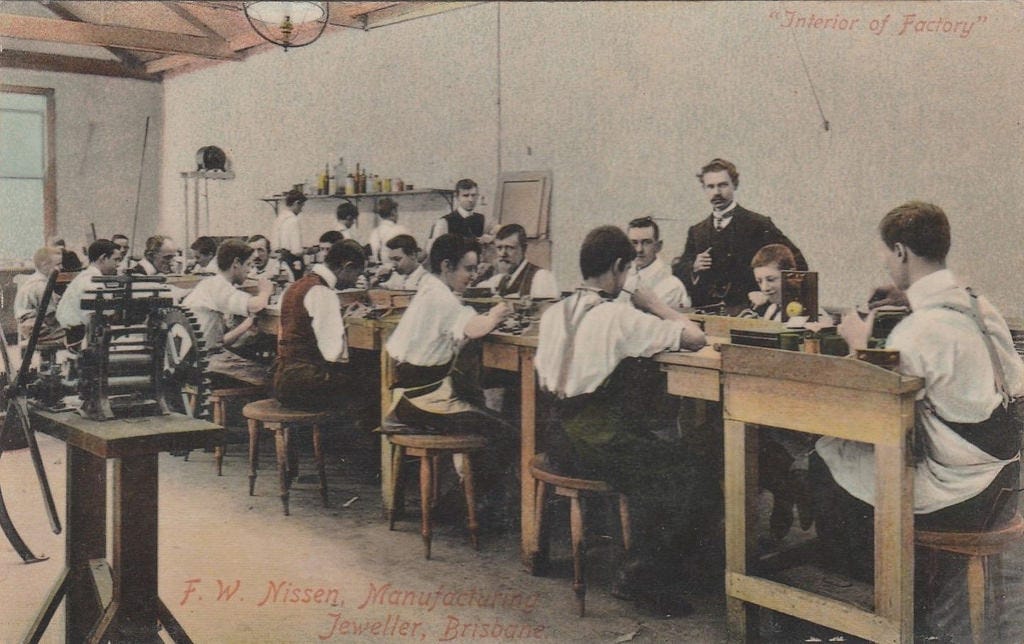How To Get Rich (Or Die Trying)
You’re not going to get rich doing what society can teach you to do.

I've Got 99 Problems, And Creating A Lucrative Career Niche Is Absolutely One
My name is Stew and I want to have an amazing career. It's pretty straightforward: I want one of those careers where you work day in and day out on the singular thing the universe has called you to do. One where you make enormous sums of money, never miss your kids' soccer games, and experience a state of flow that doesn't just muddy the definition of the word "work," but makes one pity the poor rubes forced to experience displeasure in any form in exchange for compensation.
There's one problem though: society has failed to produce a handbook on how to obtain a career that offers those things. Hell, I've never seen a job description that includes even one of them. It's ridiculous, I'm pissed, and I guess we're just left to figure this stuff out on our own.
So, let's start.
If You Can Be Trained, You Can Be Replaced
Those of us in careers with a relatively low barrier to entry are subject to an unpleasant reality: if society can train us to do something, it can train somebody else and replace us. Many of us are more replaceable than we want to acknowledge or admit.*
And if society can easily replace us, it’s generally going to be harder for us to make fat stacks of cash. There will always be somebody else out there willing and able to do the same job for less.
So, that’s not great news for those of us who don’t plan on dropping everything, going back to medical school, and entering a field with an insanely high barrier to entry. How the hell are we supposed to end up with an amazing career?
Escaping Competition: Your Unique Skill Salad
One strategy I’ve been thinking a lot about is creating and mastering a unique combination of skills that society needs but hasn't realized it yet. The skills themselves may be familiar, but the combination is new and valuable.
If society hasn't seen a particular combination of skills before then it definitely hasn't figured out a way to teach it to other people yet. If you figure out a good recipe, it's yours to own until the rest of the world catches up.
The concept of being a full-time inventor, for example, was relatively new in Thomas Edison's day, leaving him little competition. A century later, we've built up a huge infrastructure to support and train people to do research and development for new technologies that might have potential commercial applications.
What seems obvious today - a combination of scientific aptitude and business savvy is valuable - was at some point an entirely new insight.**
"If the path before you is clear, you're probably on someone else's."
Anybody who wants to carve out their own lucrative career niche, by definition, cannot look at somebody else's path and try to mimic it. Instead, maybe they could look at the raw ingredients right in front of them - their skills and interests - and see if there's a valuable combination that the world hasn't witnessed.
The world often nudges us to make the best ham sandwich we can, but maybe we should just get out whatever the hell is in the fridge and see if we can't put together something new and awesome instead.
Quote From Smart Person That Totally Backs This Up
"All successful CEO's are like this. They are almost never the best product visionaries, or the best salespeople, or the best marketing people, or the best finance people, or even the best managers, but they are top 25% in some set of those skills, and then all of a sudden they're qualified to actually run something important."
- Marc Andreessen
Anecdotal Example That Totally Proves My Point
Tristan Harris was essentially a dime-a-dozen software engineer then product manager (not rare, moderately valuable) at some of the large tech companies before he carved out a niche as a product “philosopher” (non-existent role until him) and ethical thinker at a time when society was just starting to grapple with the newfound consequences of what had up until then seemed inherently harmless or even trivial.
Most of his peers are probably competing for the same product manager roles while Harris is now in a league of his own, founding a school of thought in a valuable niche for which he’ll be the go-to guy for the foreseeable future.
Okay, so I've finally convinced you. You've decided that you’re going to become the world’s first self-driving food truck machine learning engineer. Udacity doesn’t have a course on that, so what the hell are you going to do?
Stay tuned for Sunday's Stew's Letter, dear reader.
* The barrier to becoming a reasonably competent software engineer in certain domains is just not has high as many of the pre-madonnas in the field would lead you to believe. And I don't have time to elaborate so stay the hell out of my DMs.
** Granted, the world changes and makes the same combination of skills more or less valuable depending on where in history you exist. Being a great singer during the Ice Ages probably didn't pay out in the same way it does today.

